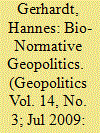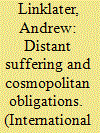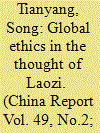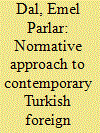| Srl | Item |
| 1 |
ID:
091050


|
|
|
|
|
| Publication |
2009.
|
| Summary/Abstract |
Building on the work of Giorgio Agamben and Michel Foucault, this paper explores the critical intersection between biopolitics and geopolitics. More specifically, an analysis is performed on the discourse that has been produced by the US executive with regard to the ongoing Darfur crisis. I interpret this discourse as part of a bio-normative geopolitical calculation aimed at maintaining the US claim on the valuation of global life without, however, committing many resources to actually protecting and securing this life within a meaningful political community. This investigation points particularly to the challenge that foreign humanitarian crises pose to the legitimacy of the United States' global hegemonic ambitions. I argue that the United States has responded to this challenge by presenting itself as a global moral hegemon whose role is primarily to judge rather than act with regard to the protection of foreign human life. As the named "genocide" in Darfur continues, the United States is also forcing a devaluation of the concept of genocide itself, thus initiating a fundamental recalibration of the relation between global ethics and geopolitics.
|
|
|
|
|
|
|
|
|
|
|
|
|
|
|
|
| 2 |
ID:
079468


|
|
|
|
|
| Publication |
2007.
|
| Summary/Abstract |
How far does globalization extend the boundaries of community by bringing distant suffering directly into the lives of onlookers, and how far does the greater visibility of suffering arouse compassion and a willingness to help? Modern self-images that stress the growth of emotional identification between the members of the same society encourage the belief that similar attachments may develop at the level of humanity as a whole. Critics of this position emphasize deep-seated tendencies to remain indifferent to remote suffering. In the light of these differences, this paper asks whether the extension of human solidarity largely depends on the development of feelings of guilt or shame when harm is done to 'distant strangers' or when little is done to help them. It asks whether universal vulnerabilities to basic forms of mental and physical suffering create the possibility of global empathy and sympathy, and whether the idea of 'embodied cosmopolitanism' provides adequate normative foundations for collective action to reduce unnecessary suffering in distant places
|
|
|
|
|
|
|
|
|
|
|
|
|
|
|
|
| 3 |
ID:
122641


|
|
|
|
|
| Publication |
2013.
|
| Summary/Abstract |
The thought of Laozi is of paramount importance in Chinese traditional culture. It is significant for us to discover some meaningful factors in Laozi's ideological systems in order to expand and strengthen China's soft power. Coincidently, there exists something in common between the thought of Laozi and ethics in Western political philosophy. The comparison of these ethical views of different value systems would help in better understanding the advantages of Chinese traditional culture in the process of China's soft power construction. This essay tries to summarise some common factors between the thought of Laozi and Western global ethics that can contribute to the construction of China's soft power. This could in turn offer an approach to establishing a 'Chinese school' in international political theories as well as contribute to global ethics architecture. This essay has been divided into three sections. The first discusses global ethics in Western political philosophy while the second investigates global ethics in Laozi's ideological system and then makes a contrast between Laozi's global ethics and those in Western political philosophy. In the final section, some fundamental principles in China's soft power construction will be explored.
|
|
|
|
|
|
|
|
|
|
|
|
|
|
|
|
| 4 |
ID:
140322


|
|
|
|
|
| Summary/Abstract |
This study explores the cosmopolitanism–communitarianism divide in normative international relations (IR) theory with a special focus on the apparent increasing weight of ethics and morality in Turkish foreign policy. First, it outlines the current debates in normative IR theory with a special focus on the divide between cosmopolitanism and communitarianism. Second, it asks whether Turkey’s foreign policy tradition, both in its discourse and its ethics, leans more toward cosmopolitanism or communitarianism. Then, it examines the slow rise of cosmopolitanism in Turkish foreign policy in the 2000s, with particular reference to the ruling political party in Turkey, the AKP (the Justice and Development Party). Finally, it examines the cosmopolitan/communitarian dilemma that the AKP government faces in the context of the Arab Spring, and specifically the Syrian civil war.
|
|
|
|
|
|
|
|
|
|
|
|
|
|
|
|